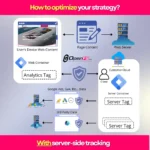The Evolution of SEO IA: Beyond Traditional Search Optimization
Remember when SEO was all about keyword stuffing and backlink schemes? Those days are long gone. Today’s SEO IA landscape combines traditional SEO principles with artificial intelligence, machine learning, and natural language processing. This fusion creates a more sophisticated approach to visibility across multiple search platforms.
Key Components of Modern SEO IA
- Natural Language Processing (NLP) integration
- Multi-platform optimization strategies
- Intent-based content creation
- AI-driven keyword research
- Automated content optimization
Building a Foundation for SEO IA Success
The first step in mastering SEO IA is understanding that we’re no longer just targeting Google’s traditional search results. Instead, we’re optimizing for a complex ecosystem of search platforms, including AI-powered search features, voice search, and large language models like ChatGPT and Google’s Gemini.
Essential SEO IA Optimization Techniques
To succeed in this new landscape, focus on these core areas:
- Entity Optimization: Help AI systems understand your content’s context and relationships
- Intent Matching: Create content that aligns with user search intent across platforms
- Technical Foundation: Ensure your site is crawlable and indexable by both traditional and AI systems
- Content Quality: Develop comprehensive, authoritative content that demonstrates expertise
Leveraging AI for Enhanced SEO Performance
One of the most exciting aspects of SEO IA is how we can use AI tools to improve our optimization efforts. Instead of replacing human expertise, these tools augment our capabilities and help us work more efficiently. For more insights on AI in digital marketing, check out our article on generative AI in digital marketing.
AI-Powered SEO Tools and Applications
Here’s how AI is transforming various aspects of SEO:
- Content analysis and optimization
- Keyword research and clustering
- Competitive analysis
- Technical SEO auditing
- Performance prediction and tracking
The Future of Search: SEO IA Integration
As search engines become more sophisticated, the line between traditional SEO and AI-driven search is blurring. We’re seeing this with Google’s AI Search features, where results are increasingly personalized and context-aware. Learn more about the future of digital marketing in our 2025 digital marketing trends article.
Preparing for the Next Generation of Search
To stay ahead of the curve, focus on:
- Building strong brand signals across multiple platforms
- Creating content that answers complex user queries
- Developing a robust technical infrastructure
- Maintaining consistent entity relationships
Practical SEO IA Implementation Strategies
Let’s break down how to put these concepts into practice:
1. Content Development Process
Start with a comprehensive content strategy that includes:
- Topic research using AI-powered tools
- Intent-based content mapping
- Entity optimization for key topics
- Multi-format content creation
2. Technical Implementation
Focus on these technical aspects:
- Schema markup implementation
- Clean HTML structure
- Fast loading speeds
- Mobile optimization
For more on technical SEO, visit our guide on SEO essentials to boost your website’s visibility.
3. Performance Monitoring
Track these key metrics:
- Traditional search rankings
- AI search visibility
- User engagement metrics
- Conversion rates
Common SEO IA Challenges and Solutions
While implementing SEO IA strategies, you might encounter these common challenges:
Challenge Solutions
- Content Quality: Use AI tools for research while maintaining human oversight
- Technical Implementation: Regular audits and updates to meet AI requirements
- Resource Allocation: Focus on high-impact activities first
- Strategy Alignment: Integrate SEO IA with overall marketing goals
Measuring SEO IA Success
Success in SEO IA requires a broader view of metrics and KPIs. For a comprehensive approach to measuring digital marketing success, check out our article on Return on Investment (ROI) in digital marketing.
Key Performance Indicators
- Visibility across multiple search platforms
- Brand mention frequency
- Entity association strength
- User engagement metrics
- Conversion rates from AI-driven search
Future-Proofing Your SEO IA Strategy
To ensure long-term success with SEO IA, consider these principles:
- Stay adaptable to new AI developments
- Focus on creating genuine value for users
- Build strong brand signals across platforms
- Maintain technical excellence
- Invest in continuous learning and adaptation
SEO IA represents the next evolution in search optimization, combining traditional SEO principles with advanced AI capabilities. By understanding and implementing these strategies effectively, you can ensure your content remains visible and valuable in an increasingly AI-driven search landscape. For more information on implementing effective SEO strategies, visit our guide on effective SEO tactics to boost your website’s search rankings.







